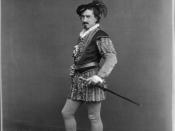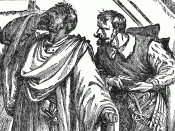In the tragic play, Othello, by William Shakespeare, Shakespeare presents the classic battle between the deceitful forces of evil and the innocence of good. Ultimately, it is the forces of evil that led to the demise of Othello, a noble Venetian Moor, who was thought to be an honorable soldier and a worthy leader. Othello's breakdown led in the murder of his wife, Desdemona, who represented the good in nature. The villain, Iago, provoked the evil contained in Othello. Iago perfectly represents evil because of his cunning, untrustworthy, and selfish nature. These traits were beneficial because they gave him the motivation to cause demise in others. Without being able to manipulate his oppressors, Iago would not have been able to prevail. Indeed, the statement, "the struggle to achieve dominance over others frequently appears in fiction," applies to the character, Iago, who used the wrath of evil to dominate good.
The play begins with Iago having immediately taken advantage of Roderigo. Roderigo had paid Iago to enkindle a love match between him and Desdemona; yet, Iago had failed. Roderigo protests, "Iago, who hast had my purse As if the strings were thine, should'st know of this (I, i, 2-3)." In response, Iago swears by God's blood that "If ever I did dream of such a matter, Abhor me (I, i, 5-6)." However, this was only one of the many fronts Iago used to gain the trust of Roderigo. In reality, Iago solely intended on using Roderigo as an apprentice in plotting Othello's demise. When Iago states that "Thus do I ever make my fool my purse (I, iii, 385)," it is obvious that Iago is fully aware of Roderigo's naïve character. He knows that Roderigo is in love with Desdemona...
![From the Library of Congress: TITLE: Thos. W. Keene. Othello CALL NUMBER: POS - TH - 1884 .O7, no. 1 (C size) [P&P] REPRODUCTION NUMBER: LC-USZC6-58 (color film copy transparency) RIGHTS INFORMATION: No known restrictions on publication. MEDIUM: 1 print (](https://s.writework.com/uploads/9/94760/library-congress-title-thos-w-keene-othello-call-number-pos-thumb.jpg)

